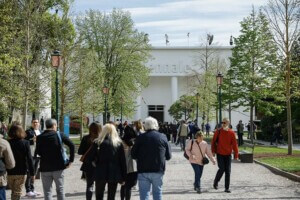Detail-unveiling exhibition announcements are now steadily trickling in for the 17th Venice Architecture Biennale, which is set to kick off in less than a month on May 22 after being postponed for a year due to the coronavirus pandemic.
An announcement of note released today comes from the Stuart Weitzman School of Design at the University of Pennsylvania, which has eight participating designer-educators and their students responding to challenges—particularly those related to global climate change—in response to curator Hakim Sarkis’s theme, How Will We Live Together?
As detailed in a news release from the Weitzman School of Design, Richard Weller, professor and chair of the Department of Landscape Architecture and co-executive director of Penn’s Ian L. McHarg Center for Urbanism and Ecology, will present three new works as part of the As One Planet exhibition at the Central Pavilion at the Giardini: The Hotspot Cities Project, which explores locales where urban sprawl is on a “collision course” with the natural world; World Park, a wildlife conservation concept in which a global network of territories would band together to protect species facing extinction, and Not the Blue Marble, a work that reimagines the view of Earth as seen by the Apollo 11 astronauts but “in the wake of environmental collapse.”
Weller’s fabrication team is comprised of Weitzman alumni Chieh Huang, Zuzanna Drozdz, Nanxi Dong, Shannon Rafferty, Lucy Whitacre, and Lujian Zhang, along with current students Oliver Atwood, Emily Bunker, Tone Chu, Francesca Garzilli, Rob Levinthal, and Allison Nkwocha.
Other participants in As One Planet, one of five scales of exhibition at the Biennale, include SPBR Arquitetos, Bethany Rigby, and Self-Assembly Lab. The four other scales are Among Diverse Beings, As New Households, As Emerging Communities, and Across Borders.
Additionally, Dutch-American architect Winka Dubbeldam, who serves as Miller Professor and chair of the Department of Architecture at Penn, and director of the university’s Advanced Research and Innovation (ARI) Lab, is acting as a creative director for City X Venice at the Italian Pavilion, a project launched to “investigate and identify dynamics of change and engagement with nature.”
In her ARI presentation, Dubbeldam will present the work of six faculty members: Masoud Akbarzadeh, assistant professor of architecture and director of the Polyhedral Structures Lab (complex geometries); Dorit Aviv, assistant professor of architecture and director of the Thermal Architecture Lab (resilience); Karel Klein, lecturer in architecture and co-director at Ruy Klein (artificial intelligence); Ferda Kolatan, associate professor of architecture and founding partner at SU11 (synthetic nature); Laia Mogas-Soldevila, assistant professor of architecture (material science); and Robert Stuart-Smith, assistant professor of architecture and director of the Autonomous Manufacturing Lab (robotics and autonomous systems).
What’s more, Dubbeldam’s New York City-based firm Archi-Tectonics will celebrate the release of its new book Strange Objects, New Solids, and Massive Things (Actar, 2021) at the City X Venice vernissage on a yet-to-be-announced date in September.
Keep an eye on AN for the latest news and developments ahead of the Venice Architecture Biennale, including a forthcoming interview with Sarkis. In our April issue, we also spoke about the enduring influence and (oft-overlooked) majesty of wood-framed construction with Paul Preissner and Paul Andersen, cocurators of the American Framing exhibition at the United States Pavilion.
The 17th Venice Architecture Biennale will run through November 21, 2021.











